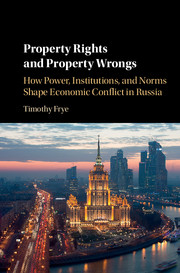 Property Rights and Property Wrongs
Property Rights and Property Wrongs Book contents
- Frontmatter
- Contents
- List of figures
- List of tables
- Acknowledgments
- Note on the text
- 1 Introduction
- 2 Power and Property
- 3 Autocratic Elections and Property Rights
- 4 Courts and Connections
- 5 Reputation and the Rule of Law
- 6 Social Norms and the Banker's Gold Watch
- 7 Conclusion
- Data Appendix
- References
- Index
7 - Conclusion
Published online by Cambridge University Press: 31 March 2017
- Frontmatter
- Contents
- List of figures
- List of tables
- Acknowledgments
- Note on the text
- 1 Introduction
- 2 Power and Property
- 3 Autocratic Elections and Property Rights
- 4 Courts and Connections
- 5 Reputation and the Rule of Law
- 6 Social Norms and the Banker's Gold Watch
- 7 Conclusion
- Data Appendix
- References
- Index
Summary
You'd think I could change anything in this country. Like hell I can. No matter what changes I propose and carry out, everything stays the same. Russia is like a tub full of dough, you put your hand down in it, down to the bottom, and think you're master of the situation. When you first pull out your hand, a little hole remains, but then, before your very eyes, the dough expands into a spongy, puffy mass. That's what Russia is like.
Nikita Khrushchev to Fidel Castro in 1963 (Taubman 2004: 598)Creating strong property rights after the fall of a command economy was never going to be easy and this is especially true in Russia. For 25 years rulers of Russia have reached down deep into the tub of dough, pulled out their hands, and been frustrated by the results. Yet Khrushchev's colorful quote is only half right. For all the frustrations, Russia has changed, for better and for worse, in many ways, and before our very eyes.
To try to understand these changes I have used a variety of survey experiments, a natural experiment, statistical analyses, and administrative data to explore these attempts to shape property rights in Russia. Rather than making blanket claims about the state of property in Russia or trying to develop a unified theory of property rights, I focused on several key potential shapers of property rights, including the bargaining power of rulers and right-holders, social norms, such as attitudes toward privatization; informal institutions, such as reputation, and formal institutions, such as courts and elections.
That bargaining power and political connections shape property rights is well accepted, but bargaining power is multifaceted and scholars debate which dimensions are most important. I unpack the bargaining power of right-holders by exploring how firm size, mobility, and various forms of political connections shape perceptions of property rights and find that managers of state-owned, smaller, and less mobile firms view themselves as especially likely to be the target of a hostile takeover, as do managers who previously worked in the state bureaucracy or do not know the governor personally. In addition, political connections can mitigate these vulnerabilities as managers of state-owned, smaller, and less mobile firms who know the governor personally view their property rights as significantly more secure than those who do not.
- Type
- Chapter
- Information
- Property Rights and Property WrongsHow Power, Institutions, and Norms Shape Economic Conflict in Russia, pp. 197 - 205Publisher: Cambridge University PressPrint publication year: 2017


